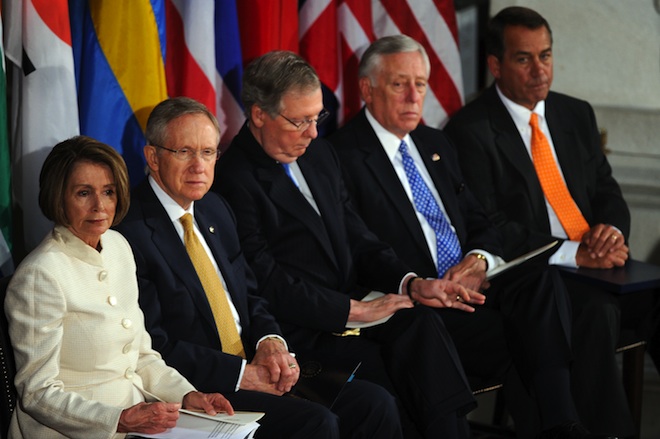If Congress passed legislation to fund the federal government for a year, then scattered to the four winds, the United States would find itself in recession sometime in 2013.
That’s what the non-partisan Congressional Budget Office concluded in a Tuesday report, meant to alert elected officials to the dangers of allowing the country to fall off the “fiscal cliff.” That’s shorthand for allowing all of the Bush tax cuts and the payroll tax holiday, extended unemployment benefits, and Medicare physician reimbursement rates to expire; and to allow spending on domestic and defense programs to be cut indiscriminately. All of these things will happen automatically at the beginning of the year if Congress does nothing.
Budget deficits would fall dramatically, but at the expense of hundreds of thousands or millions of jobs at a time when the country’s current economic maladies are just beginning to heal. By contrast, protecting the recovery likely means large budget deficits will persist for quite some time.
If there were an obvious way around this conundrum you’d think Congress would’ve taken it. In reality, according to policy experts and economists of a wide range of ideological leanings there is an obvious way around this conundrum — and yet Congress isn’t taking it.
You can summarize the easy approach as “stimulus now, fiscal restraint later.” CBO hinted at this approach in its report.
“[I]f lawmakers changed fiscal policy in late 2012 to remove or offset all of the policies that are scheduled to reduce the federal budget deficit by 5.1 percent of GDP between calendar years 2012 and 2013…CBO estimates, the growth of real GDP in calendar year 2013 would lie in a broad range around 4.4 percent, well above the 0.5 percent projected for 2013 under current law,” the report reads. “However, eliminating or reducing the fiscal restraint scheduled to occur next year without imposing comparable restraint in future years would reduce output and income in the longer run relative to what would occur if the scheduled fiscal restraint remained in place.”
In other words Congress could promote real growth by keeping deficits high now, and avoid the future downside risks of large, structural budget deficits by enacting sequential legislation to reduce deficits that won’t take effect until the economy’s growing at a decent clip.
“I think we should pass a very tough deficit reduction plan now and provide for it to trigger when the economy has reached like three percent growth for a few quarters,” Bill Clinton told guests at the Pete Peterson Fiscal Summit a week ago.
Even Fed Chairman Ben Bernanke — a Republican, who for institutional reasons is constrained from providing specific policy recommendations — has outlined a similar approach.
“[T]he two goals of achieving fiscal sustainability–which is the result of responsible policies set in place for the longer term–and avoiding the creation of fiscal headwinds for the current recovery are not incompatible,” he said in a speech last August. “Acting now to put in place a credible plan for reducing future deficits over the longer term, while being attentive to the implications of fiscal choices for the recovery in the near term, can help serve both objectives. Fiscal policymakers can also promote stronger economic performance through the design of tax policies and spending programs. To the fullest extent possible, our nation’s tax and spending policies should increase incentives to work and to save, encourage investments in the skills of our workforce, stimulate private capital formation, promote research and development, and provide necessary public infrastructure. We cannot expect our economy to grow its way out of our fiscal imbalances, but a more productive economy will ease the tradeoffs that we face.”
Just because it’s obvious, doesn’t mean it’s easy. There are a lot of members of Congress, and they all have different spending and tax priorities. And, of course, there’s an election coming. But members aren’t even bickering within the framework Clinton, Bernanke and the CBO have outlined. A lot of Democrats are sympathetic to this approach, but Republicans are only on board if the future deficit reduction comes only from massive cuts to government services. They might be willing to defer the budget consolidation, but only if Democrats agree to use the country’s budget deficits as a forcing mechanism to shrink the government’s role in providing social insurance to the poor, middle class, and elderly.
The parties can’t even agree on the broadest contours of a strategy to nurture the recovery and then phase out the remnant structural deficits. Which is why this week’s CBO report rattled policy makers so much.










